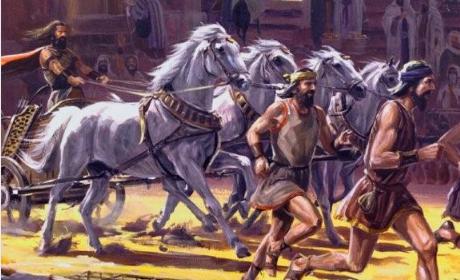Damien F. Mackey
“The picture of Absalom that is presented in 2 Samuel 13–19
suggests that
he was the Alcibiades of the Old Testament, alike in his personal
attractiveness,
his lawless insolence, and his tragic fate”.
Britannica.com
There is that
knee-jerk reaction, again, that the Hebrew must be based upon the pagan Greek.
Absalom was not
“the Alcibiades of the Old Testament”.
Absalom was a fully
fleshed-out historical son of King David, and the Greeks later, in their
typical fashion, appropriated Absalom as their fictitious character, “Alcibiades”
(or Alkibiades).
Many parallels
could be drawn between Absalom and Alcibiades, and some have been.
For instance:
Rosalyn Rossignol writes,
in “Critical Companion to Chaucer: A Literary
Reference to His Life and Work” (p. 319): “Like the biblical
ABSALOM … Alcibiades became legendary for his
beauty, and two of Chaucer’s references to him are attributable to that”.
And:
“The value of team-work is a comparatively new
idea to western Asia and eastern Europe. Since the days of Alcibiades and
Absalom the old ideal has been that of "every man for himself." If it
had not been so, the history of the world might have been different”.
And:
"What! Densdeth, the cleverest man I have ever
met?"
"The same."
"Densdeth, handsome as Alcibiades, or perhaps
I should say Absalom, as he is Hebrewish ?"
"That very Alcibiades, Absalom,
Densdeth."
And:
The stories of the great
lovers prick our hearts and illumine our minds: Ruth and Naomi, David and
Absalom, Jonathan and David, Achilles and Patroclus, Socrates and Alcibiades,
Jesus and John.
Ruth said to Naomi,
“Entreat me not to leave thee, or to return from following after thee: for
whither thou goest, I will go; and where thou lodgest, I will lodge: thy people
shall be my people, and thy God my God: Where thou diest, will I die, and there
will I be buried: the LORD do so to me, and more also, if ought but death part
thee and me.” ….
Socrates declared to
Alcibiades: “I am the only friend who has never left you because I was the only
lover of you, the rest were lovers only of what was yours.... [I am sent by God
to bring you to self-knowledge]. If your soul, my dear Alcibiades, is to know
herself, she must see ... her highest part, the spring of her virtue [mirrored
in another] ... [There she will see what of herself] resembles God. Whoever
looks at this, and comes to know all that is divine, will gain thereby the best
knowledge of himself. ….
Achilles wept: “My dear
friend has perished, Patroclus, whom I loved beyond all my companions, as well
as my own life...and now I must die soon because I was not there to stand beside
my friend when he was killed.” ….
David was much moved,
and went up to the chamber over the gate, and wept: and as he went, thus he
said, “O my son Absalom, my son, my son Absalom! would God I had died for thee,
O Absalom, my son, my son!” ….
Jesus said: “This is my
commandment, That ye love one another, as I have loved you. Greater love hath
no man than this, that a man lay down his life for his friends. Ye are my
friends.” ….

No comments:
Post a Comment